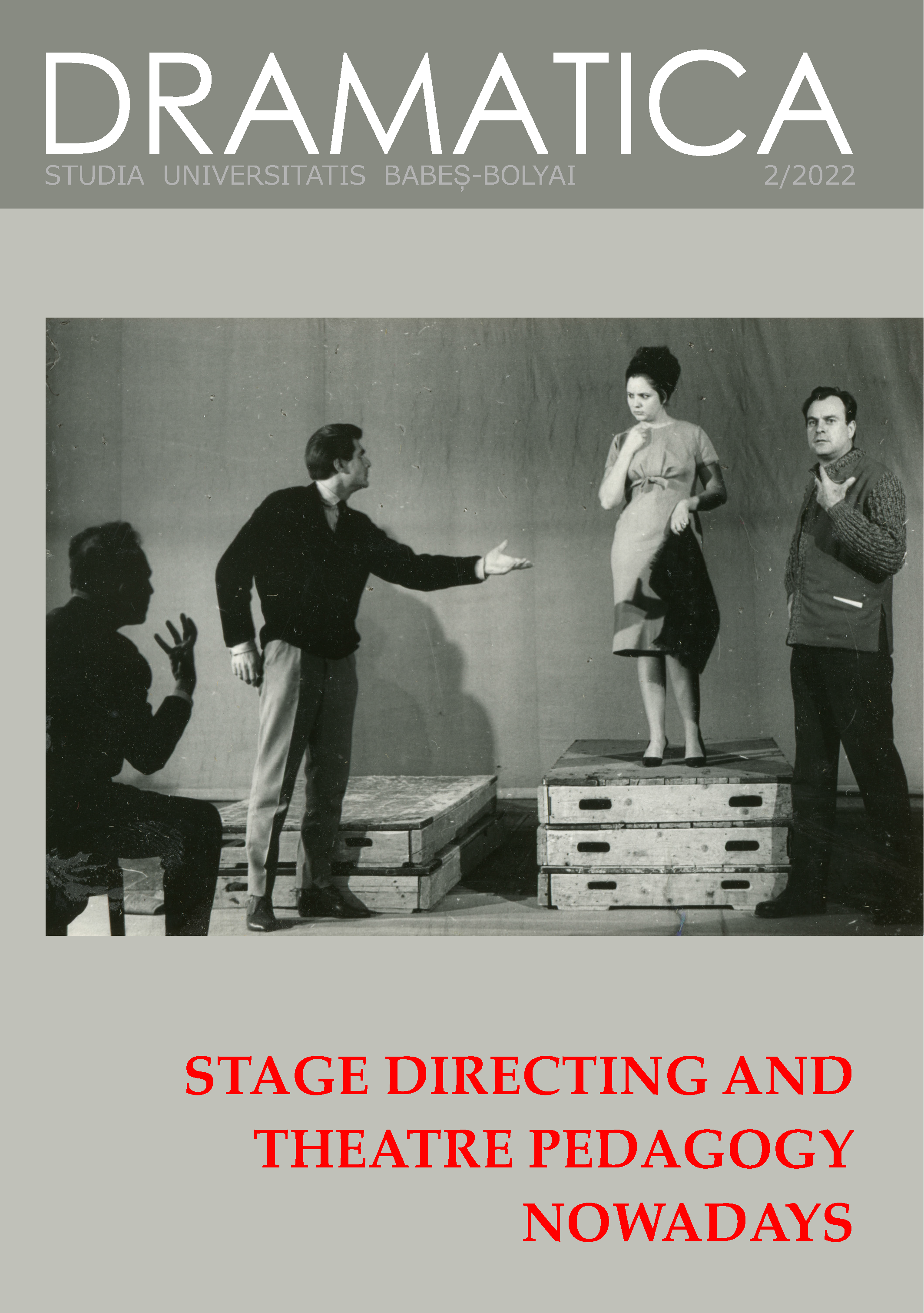Paradigms of Education in the Art of Acting
DOI:
https://doi.org/10.24193/subbdrama.2022.2.01Keywords:
interculturality, art of acting, Zen, Nō theater, martial arts, holism, body-mind, imagination.Abstract
Embedded in interculturality and transculturality, this paper focuses on the actor’s training, on facing, understanding and assimilating the theater lessons of the Far East, especially those of the Nō theater, based on the constructive encounters with them by practicing the Tadashi Suzuki (b. 1939) method, Japanese martial arts, researching Zen philosophy and the writings of Zeami Motokiyo (1363-1443). This article points out the similarity between certain paradigms of the Western theatricality with those of the Far Eastern one (holism, body-mind, here and now, flow, imaginary) as well as their fusion with other paradigms due to the interdisciplinary transfer existing between martial arts (aikidō and iaidō), Japanese culture, and the art of acting (shin-waza-tai, shoshin, ichigo ichie). The way in which fixed forms relate to imagination (kata), specific to both Far Eastern theater and martial arts (aikidō and iaidō), is also very important. This research highlights the essential nature of the fixed form for the impulses of imagination and creative freedom.
References
Barba, Eugenio. On Directing and Dramaturgy. Burning the House. Translated by Judy Barba. London & New York: Routledge, 2010.
Barba, Eugenio. The Paper Canoe. A Guide to Theatre Anthropology. Translated by Richard Fowler. London and New York: Routledge, 2005.
Barba, Eugenio. The Moon Rises from the Gange. My journey through Asian Acting Techniques. Edited, introduced, and with an appendix by Lluís Masgrau, photo selection and captions by Rina Skeel, translated from Italian by Judy Barba. New York and London: Routledge 2015.
Barba, Eugenio and Nicola Savarese. A Dictionary of Theatre Anthropology. The Secret Art of the Performer. London & New York: Routledge, 1991.
Csikszentmihaly, Mihaly. Flow: The Psychology of Optimal Experience. New York: Harper Collins, 2008.
Csikszentmihaly, Mihaly. Finding Flow. The Psychology of Engagement with Everyday Life. New York: Harper Collins/ Basic Books, 1997.
Deshimaru, Taisen. Zen et arts martiaux. Paris, Albin Michel: 1983.
Fraguas, Jose M., Karate Masters, vol. II, Deschizătorii de drumuri [Karate Masters 2, The Pathfinders]. Translated by: Monica Hriscu, Documentation: Eva Ion. Cluj-Napoca: Curs Publishing House, 2020.
Grotowski, Jerzy. Towards a Poor Theatre. Edited by Eugenio Barba, Preface by Peter Brook. New York: Routledge, 2002.
Goleman, Daniel. Focus: The Hidden Driver of Excellence. New York: Harper, 2013.
Lévi-Strauss, Claude. The Other Face of the Moon. Writings about Japan, Foreword by Junzo Kawada, Translated by Jane Mary Todd. Cambridge, Massachusetts, and London, England: The Belknap Press of Harvard University Press, 2013.
Marcus, Solomon. “Monism japonez și postmodernism occidental” [“Japanese Monism and Western Postmodernism”]. Secolul XX, nr. 11-12/ 404-405 (1998): 33-40.
Măniuțiu, Mihai. Despre mască și iluzie [On Mask and Illusion]. Bucharest: Humanitas Publishing House, 2007.
Mărginean Kohno, Ruxandra. Teatrul Nō. Tradiția creatoare [The Creative Tradition of Nō Theatre], Craiova, Scrisul Românesc Foundation, 2009.
Mnouchkine, Ariane. Arta prezentului. Convorbiri cu Fabienne Pascaud [The Art of the Present. Conversations with Fabienne Pascaud]. Translated from French by Daria Dimiu. Bucharest: “Camil Petrescu” Cultural Foundation, Cheiron Publishing House, 2010.
Mnouchkine, Ariane. Introduction, selection and presentation by Béatrice Picon-Vallin, Translated from French by Andreea Dumitru, Bucharest: “Camil Petrescu” Cultural Foundation, Cheiron Publishing House, 2010.
Mogi, Ken. The Little Book of Ikigai. The Essential Japanese Way to Finding Your Purpose in Life. London: Quercus Editions, 2017.
Oida, Yoshi and Lorna Marshall. The Invisible Actor. Foreword by Peter Brook. New York & London: Routledge, 1998.
Penciulescu, Radu. “Ici et Maintenant” from “Les « Dits » de Radu Penciulescu.” In Patrick Pezin, Le livre des exercices à lʼusage des comédiens, suivi de Une amulette faite de mémoire, La signification des exercices dans la dramaturgie de lʼacteur par Eugenio Barba, 329-363. Saussan: Éditions LʼEntretemps, 1999.
Siegel, Daniel. The Mindful Brain. Reflection and Attunement in the Cultivation of Well-Being. New York: W. W. Norton, 2007.
Suzuki, Shunryu. Zen Mind, Beginnerʼs Mind. Edited by Trudy Dixton, foreword by Huston Smith, introduction by Richard Baker. New York & Tokio: Weatherhill, 1995.
Zarrilli, Phillip. (Toward) A Phenomenology of Acting, Foreword Evan Thompson, London & New York, Routledge, 2020.
Zarrilli, Phillip. When the Body Becomes All Eyes: Paradigms, Discourses and Practices of Power in Kalarippayattu. Oxford: Oxford University Press, 2010.
Zeami. On the Art of the Nō Drama. The Major Treatises of Zeami. Translated by
J. Thomas Rimer Yamazaki Masakazu. Princeton, New Jersey: Princeton University Press, 1984.
Downloads
Published
How to Cite
Issue
Section
License
Copyright (c) 2022 Studia Universitatis Babeș-Bolyai Dramatica

This work is licensed under a Creative Commons Attribution-NonCommercial-NoDerivatives 4.0 International License.


